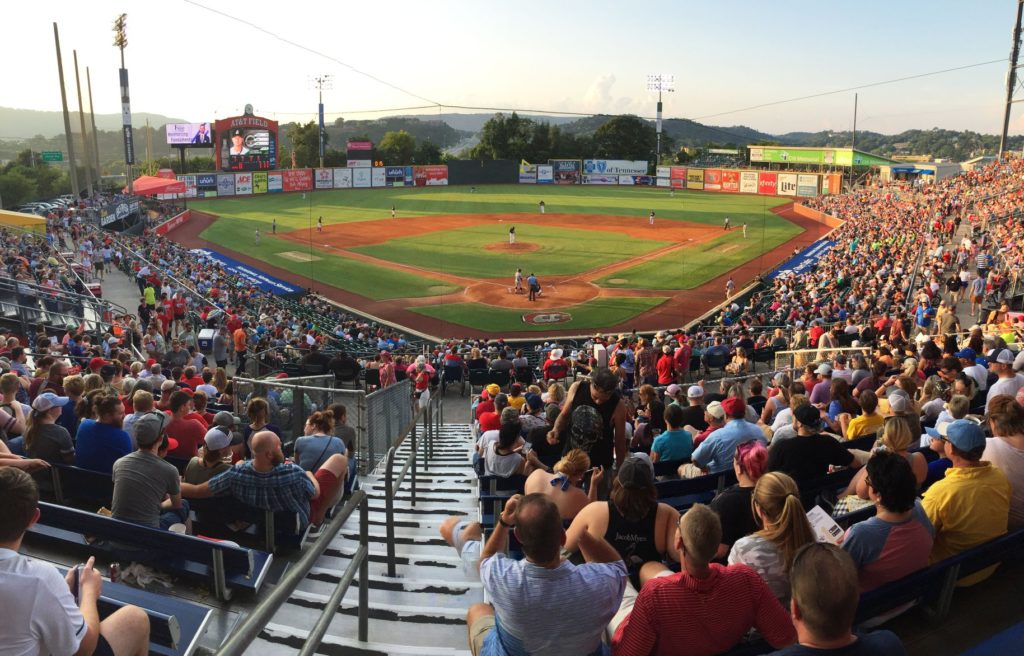The battle against MLB’s plans to contract 42 MiLB franchises sees a new set of participants with the establishment of a task force made up of 30-plus U.S. mayors, many of whom from cities not in danger of losing their minor-league teams.
Led by Chattanooga (TN) Mayor Andy Berke, Dayton (OH) Mayor Nan Whaley and Columbia (SC) Mayor Steve Benjamin, the group publicly launched with a press conference yesterday and quickly grew, even within the 45 minutes of the call-in presser. For the mayors, the issue transcends the potential loss of teams in their cities: it affects the entire relationship between pro baseball and the cities that support Minor League Baseball, ranging from public funding of facilities to how players interact with the community.
Calling the move by MLB a “major league error,” Berke says his city is the kind of market MLB would be misguided to lose: with a long history of pro baseball, Chattanooga is an up-and-coming city with robust job growth and a strong real-estate market, sporting millennial demographics most marketers highly covet. Chattanooga Lookouts (Class AA; Southern League) owner Jason Freier has been working for some time on a new-ballpark plan, but the contraction proposal would short-circuit that effort.
One challenge facing a mayoral task force: unlike a Congressional group that could seriously impact MLB’s bottom line by repealing baseball’s anti-trust and minimum-wage exemptions and liberal visa allocation, the mayors don’t have any powerful tools at their disposal. However, the group of mayors on the call—which also included Grand Rapids (MI) Mayor Rosalynn Bliss, Lansing (MI) Andy Schor and Akron (OH) Mayor Dan Horrigan—say they can impact the discussions by acting as the voices of fans affected by contraction. The participation of mayors who are not slated to lose teams, they added, showed a bipartisan solidarity that gives them the credibility to participate in the public debate over the future of pro baseball.
“We think there are plenty of opportunities for us to change the direction of these discussions,” Berke said.
“We want to make sure MiLB is expanded, not contracted, as we’ve seen benefits for our communities,” Whaley said, pointing to the continued success of the Dayton Dragons (Low A; Midwest League) and the team’s impact in reviving an underdeveloped part of her city. Similarly, Schor pointed out the impact the Lansing Lugnuts (Low A; Midwest League) and Cooley Law School Stadium have had in the Michigan capital, anchoring what he called the “stadium district”—a formerly shady and seedy area that’s now turned around.
However, they added, there is one economic tool in their arsenal: end public funding of new ballparks and improved facilities. At a time when MLB is demanding upgraded player facilities, contraction doesn’t exactly inspire confidence among public officials: their teams may be next.
“This does not incentivize cities to invest in ballparks,” Whaley said. “It does not build a partnership.”
“Right now, all of us have very little confidence in what the future holds,” Berke added.
Schor pointed out that Lansing puts money into Cooley Law School Stadium on an ongoing basis on projects big and small. Of late, for example, the city funded extended netting to better protect fans. And, if MLB ever actually formulates what it wants to see in player facilities (larger clubhouses, new weight rooms and batting cages), you can bet municipalities will be asked to pick up the tab.
The next step for the mayoral task force is to continue organizing. The three chairs did participate in a conference call last week with MLB representatives. Given that the group was unveiled yesterday at the U.S. Conference of Mayors in Washington, D.C., we would expect other mayors to formally announce their participation in the group.
(Speaking of the Midwest League: the circuit released a powerful video detailing the relationships between its cities and teams, past and present, as an argument against contraction.)
Image of AT&T Field courtesy Chattanooga Lookouts.
This article first appeared in the Ballpark Digest newsletter. Are you a subscriber? It’s free, and you’ll see features like this before they appear on the Web. Go here to subscribe to the Ballpark Digest newsletter.

